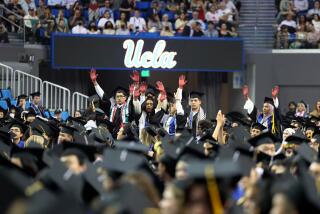Chinese Students Urged to Shun Dissent
- Share via
PEKING — China dispatched several of its top leaders Sunday to tell a convocation of university students that they should follow the leadership of the Communist Party and concentrate on their studies rather than on political demonstrations and protests.
“Today’s central task is to reconstruct the motherland, turning it into a strong socialist power,” said Vice Premier Li Peng, a member of the Politburo and the adopted son of the late Premier Chou En-lai. “. . . In order to realize this aim, we have to maintain stability and unity.”
Li delivered the keynote speech on behalf of the government before approximately 6,000 students gathered in Peking’s Great Hall of the People for ceremonies marking the 50th anniversary of the Dec. 9, 1935, demonstrations by students in Peking against Japanese aggression.
At the ceremonies, an army band played and students were encouraged to stand and sing such patriotic songs as “Socialism Is Good” and “Without the Communist Party, There Would Be No New China.” Some young people referred to song sheets to help them remember the words or melodies.
Since last year, Chinese students have put up wallposters and staged several demonstrations as protests against poor conditions on campus, as well as denouncing a “second invasion” of China by Japanese consumer goods and scoring the inflation and corruption that have accompanied China’s economic reforms. In addition, some students have called for greater political freedom.
Chinese authorities made little attempt to hide their concern that the anniversary of the Dec. 9 student movement could prompt a new, perhaps more serious wave of protests against the regime and its policies.
Students Forewarned
But no demonstrations were reported in Peking over the weekend, and some campus sources said they felt the intense attention given to the Dec. 9 anniversary by the official press in recent weeks has made students wary of the consequences of actions posing a direct challenge to the authorities.
Instead, the weekend was filled with events at which Chinese leaders sought to convey the message that times have changed since 1935 and that the role for students in China now is to support the government and its economic reform programs.
At Peking University, the center of the student protests in 1935 and this year, about 2,000 students attended official ceremonies Saturday at which former Chinese Foreign Minister Huang Hua told them to carefully study Marxism so as to understand “what is capitalism, what is feudalism, what is degenerate.”
Tickets were required for admission to the Peking University events. Once inside, many students read kung fu novels, love stories or, in one instance, the book “How to Play Bridge” while they listened to the speeches of government, Communist Party and academic leaders.
On Sunday, the authoritative Communist Party newspaper People’s Daily published what it said was a letter from the Peking University student body to other students throughout China.
“Enthusiastically supporting and throwing ourselves into reform is the unshirkable duty of today’s university students,” the letter said. “ . . . Reform has opened up a beautiful future for us.”
The convocation of students Sunday in the Great Hall of the People constituted the regime’s main official response to the demonstrations. The ceremonies were sponsored by the China Youth League and the All-China Student Federation. Once again, tickets were required, and many students came on officially arranged buses.
Li, who is thought to be in line to become premier within the next few years, acknowledged to the students that Chinese leaders have made “some problems and even errors” in attempting to overhaul the nation’s far-flung economic system. But he also said that students today have some “weak points. . . . What they have is only training from books.”
He issued a veiled warning against trying to introduce Western political concepts in China.
“While we are introducing some advanced things into the country, we should not allow in the capitalist concept of value and decadent way of life, because they conflict with our socialist system,” the vice premier said. “Any attempt to follow the capitalist road will not succeed in China. Bourgeois liberalism would only make a mess of Chinese affairs and would not be tolerated.”
All speakers at Sunday’s events refrained from criticizing modern-day Japan.
Over the weekend, Communist Party general secretary Hu Yaobang, the top aide to Chinese leader Deng Xiaoping told a Japanese novelist here that it might take another 40 years for the scars of World War II to heal in China. Hu himself has been the spearhead of efforts by the Peking authorities in recent years to forge close relations with Japan.
More to Read
Sign up for Essential California
The most important California stories and recommendations in your inbox every morning.
You may occasionally receive promotional content from the Los Angeles Times.













